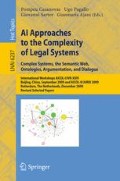Abstract
This paper argues in favour of the necessity of dynamically restricting and expanding the applicability of norms regulating computer systems like multiagent systems, in situations where the compliance to the norm does not achieve the purpose of the norm. We propose a logical framework which distinguishes between constitutive and regulative norms and captures the norm change power and at the same time the limitations of the judicial system in dynamically revising the set of constitutive rules defining the concepts on which the applicability of norms is based. In particular, the framework is used to reconstruct some interpretive arguments described in legal theory such as those corresponding to the Roman maxims lex minus dixit quam voluit and lex magis dixit quam voluit. The logical framework is based on an extension of defeasible logic.
Access this chapter
Tax calculation will be finalised at checkout
Purchases are for personal use only
Preview
Unable to display preview. Download preview PDF.
References
Antoniou, G., Billington, D., Governatori, G., Maher, M.J.: Representation results for defeasible logic. ACM Trans. Comput. Log. 2(2), 255–287 (2001)
Bench-Capon, T.J.M.: The missing link revisited: The role of teleology in representing legal argument. Artif. Intell. Law 10(1-3), 79–94 (2002)
Billington, D., Antoniou, G., Governatori, G., Maher, M.J.: Revising nonmonotonic belief sets: The case of defeasible logic. In: Burgard, W., Christaller, T., Cremers, A.B. (eds.) KI 1999. LNCS (LNAI), vol. 1701, pp. 101–112. Springer, Heidelberg (1999)
Boella, G., van der Torre, L.: Fulfilling or violating obligations in multiagent systems. In: Procs. IAT 2004 (2004)
Boella, G., van der Torre, L.: Norm negotiation in multiagent systems. Int. Journal Coop. Inf. Syst. 16(1), 97–122 (2007)
Casanovas, P. (ed.): Proc. LOAIT 2007. CEUR (2008)
Ginsberg, M.L.: Universal planning: An (almost) universally bad idea. AI Magazine 10(4), 40–44 (1989)
Governatori, G., Maher, M.J., Billington, D., Antoniou, G.: Argumentation semantics for defeasible logics. Journal of Logic and Computation 14, 675–702 (2004)
Governatori, G., Olivieri, F., Scannapieco, S., Cristani, M.: Superiority based revision of defeasible theories. In: Proc. NMR 2010. CUER (2010)
Governatori, G., Rotolo, A.: BIO logical agents: Norms, beliefs, intentions in defeasible logic. Autonomous Agents and Multi-Agent Systems 17(1), 36–69 (2008)
Governatori, G., Rotolo, A.: A computational framework for institutional agency. Artif. Intell. Law 16(1), 25–52 (2008)
Governatori, G., Rotolo, A., Sartor, G.: Temporalised normative positions in defeasible logic. In: Proc. ICAIL 2005, pp. 25–34. ACM, New York (2005)
Grossi, D.: Desigining Invisible Hancuffs. Formal Investigations in Institutions and Organizations for Multi-Agent Systems. PhD thesis, Utrecht University (2007)
Hage, J.: Reasoning with Rules: An Essay on Legal Reasoning and Its Underlying Logic. Kluwer, Dordrecht (1997)
Hart, H.L.A.: Positivism and the separation of law and morals. Harvard Law Review 71(4), 593–629 (1958)
Peczenik, A.: On law and reason. Kluwer, Dordrecht (1989)
Prakken, H.: An exercise in formalising teleological case-based reasoning. Artif. Intell. Law 10, 113–133 (2002)
Sartor, G.: Legal reasoning: A cognitive approach to the law. Springer, Dordrecht (2005)
Sartor, G.: Fundamental legal concepts: A formal and teleological characterisation. Artif. Intell. Law 14(1-2), 101–142 (2006)
Searle, J.R.: The Construction of Social Reality. The Free Press, New York (1995)
Skalak, D.B., Rissland, E.L.: Arguments and cases: An inevitable intertwining. Artif. Intell. Law 1, 3–44 (1992)
van der Torre, L., Boella, G., Verhagen, H. (eds.): Normative Multi-agent Systems. Special Issue of JAAMAS, vol. 17(1) (2008)
Author information
Authors and Affiliations
Editor information
Editors and Affiliations
Rights and permissions
Copyright information
© 2010 Springer-Verlag Berlin Heidelberg
About this paper
Cite this paper
Boella, G., Governatori, G., Rotolo, A., van der Torre, L. (2010). Lex Minus Dixit Quam Voluit, Lex Magis Dixit Quam Voluit: A Formal Study on Legal Compliance and Interpretation. In: Casanovas, P., Pagallo, U., Sartor, G., Ajani, G. (eds) AI Approaches to the Complexity of Legal Systems. Complex Systems, the Semantic Web, Ontologies, Argumentation, and Dialogue. AICOL 2009. Lecture Notes in Computer Science(), vol 6237. Springer, Berlin, Heidelberg. https://doi.org/10.1007/978-3-642-16524-5_11
Download citation
DOI: https://doi.org/10.1007/978-3-642-16524-5_11
Publisher Name: Springer, Berlin, Heidelberg
Print ISBN: 978-3-642-16523-8
Online ISBN: 978-3-642-16524-5
eBook Packages: Computer ScienceComputer Science (R0)

